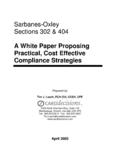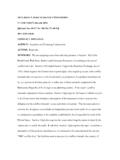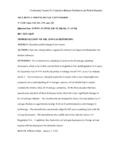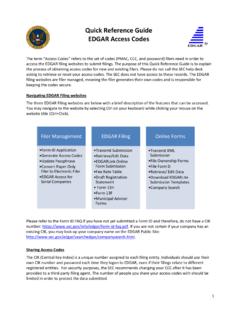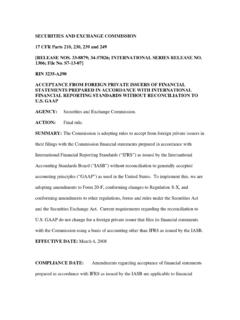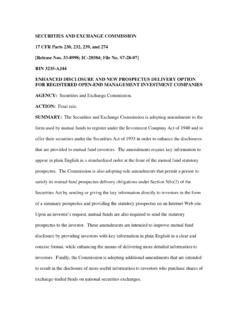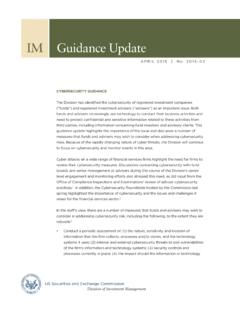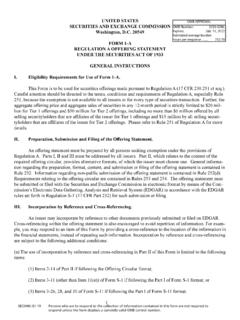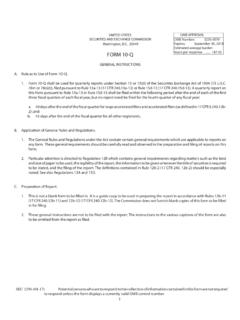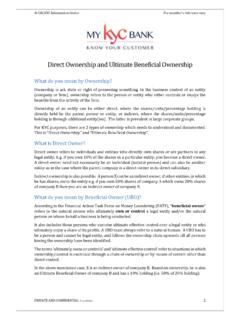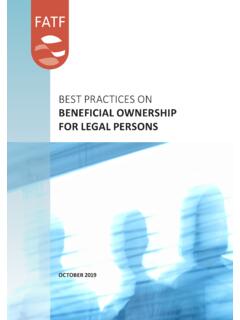Transcription of FACT SHEET Modernization of Beneficial Ownership Reporting
1 FACT SHEET Modernization of Beneficial Ownership Reporting SECURITIES AND EXCHANGE COMMISSION PAGE 1 OF 2 Background Exchange Act Sections 13(d) and 13(g), along with Regulation 13D-G, require that an investor who beneficially owns more than 5 percent of a covered class of equity securities must report such Beneficial Ownership by publicly filing either a Schedule 13D or a Schedule 13G. The current deadlines for filing the initial Schedule 13D and Schedule 13G have not been updated since 1968 and 1977, respectively. Changes in the financial markets and technology warrant a reassessment of these filing deadlines and other aspects of the Beneficial Ownership rules to meet the needs of today s investors and other market participants.
2 New Schedule 13D and 13G Filing Deadlines For Schedule 13D, the proposed amendments would shorten the initial filing deadline from 10 days to five days and require that amendments be filed within one business day. For certain Schedule 13G filers ( , qualified institutional investors and exempt investors), the proposed amendments would shorten the initial filing deadline from 45 days after year-end to five business days after the end of the month in which the investor beneficially owns more than 5 percent of the covered class. For other Schedule 13G filers ( , passive investors), the proposed amendments would shorten the initial filing deadline from 10 days to five days.
3 Finally, for all Schedule 13G filers, the proposed amendments would require that an amendment be filed five business days after the month in which a material change occurred rather than 45 days after the year in which any change occurred. The proposed amendments also would accelerate the amendment obligations for certain Schedule 13G filers upon exceeding 10 percent Beneficial Ownership or a 5 percent increase or decrease in Beneficial Ownership of a covered class, requiring that qualified institutional investors and passive investors file an amendment within five days and one business day, respectively. To ease filers administrative challenges resulting from these shortened deadlines, the proposed amendments would extend the filing cut-off times for Schedules 13D and 13G from 5:30 to 10:00 Eastern time.
4 The Securities and Exchange Commission proposed amendments to modernize the rules governing Beneficial Ownership Reporting . The proposed amendments to Regulation 13D-G would: Accelerate the filing deadlines for Schedules 13D and 13G Beneficial Ownership reports; Expand the application of Regulation 13D-G to certain derivative securities; Clarify the circumstances under which two or more persons have formed a group that would be subject to Beneficial Ownership Reporting obligations; and Require that Schedules 13D and 13G be filed using a structured, machine-readable data language. FACT SHEET | Modernization of Beneficial Ownership Reporting SECURITIES AND EXCHANGE COMMISSION Page 2 of 2 Regulation of Certain Derivative Securities The proposed amendments would provide that holders of certain cash-settled derivative securities will be deemed Beneficial owners of the reference equity securities.
5 Specifically, proposed new Rule 13d-3(e) would provide that a holder of a cash-settled derivative security, other than a security-based swap, will be deemed the Beneficial owner of the reference equity securities if the derivative is held with the purpose or effect of changing or influencing the control of the issuer of the reference securities, or in connection with or as a participant in any transaction having such purpose or effect. In addition, the proposed amendments would revise Item 6 of Schedule 13D to clarify that a person is required to disclose interests in all derivative securities (including cash-settled derivative securities) that use the issuer s equity security as a reference security.
6 Clarification of Group Formation and Related Exemptions The proposed amendments would clarify the circumstances under which two or more persons have formed a group under Regulation 13D-G and the Exchange Act. Those circumstances would include, among other things, tipper-tippee relationships in which a person shares non-public information about an upcoming Schedule 13D filing with another person who subsequently purchases the issuer s securities based on that information. In addition, the proposed amendments would provide new exemptions to permit investors to communicate and consult with each other, jointly engage with issuers, and execute certain transactions without being subject to regulation as a group.
7 Specifically, those exemptions would address circumstances in which (1) investors communicate with one another or the issuer without the purpose or effect of changing or influencing control of the issuer and (2) investors and financial institutions enter into agreements governing the terms of derivative securities. Structured Data requirements for Schedules 13D and 13G To make it easier for investors and markets to access, compile and analyze information disclosed on Schedules 13D and 13G, the proposed amendments would require that these filings use a structured, machine-readable data language. This requirement would apply to all information disclosed on Schedules 13D and 13G.
8 Additional Information: The public comment period will remain open for 60 days following publication of the proposing release on the SEC s website or 30 days following publication of the proposing release in the Federal Register, whichever period is longer.
